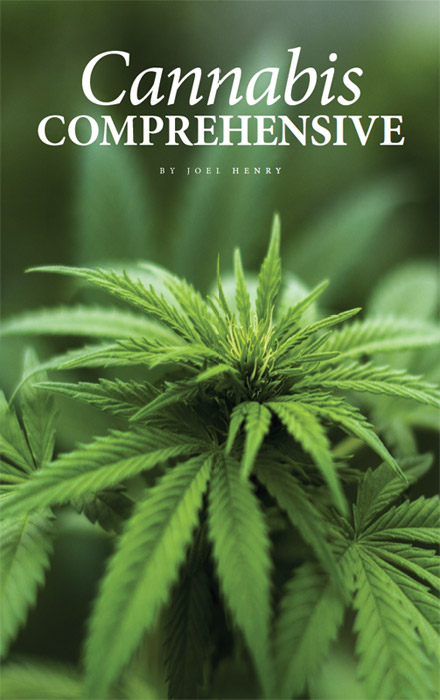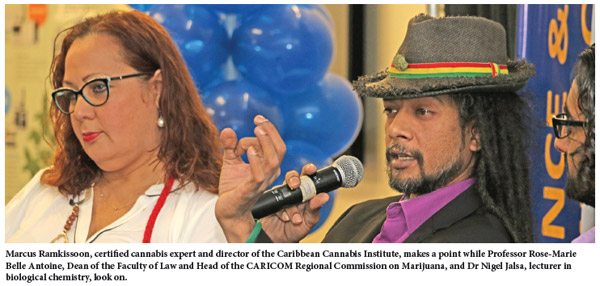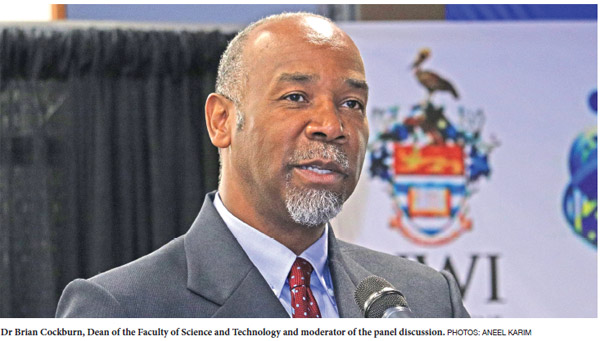
 Are the giant, international pharmaceutical companies trying to colonise Caribbean cannabis production? Should we focus on more research for the medicinal potential of cannabis or is now the time to start manufacturing and selling products? How do we heal the divide between traditional marijuana users such as Rastafarians, and the scientific community? And just what exactly is “kush”? Are the giant, international pharmaceutical companies trying to colonise Caribbean cannabis production? Should we focus on more research for the medicinal potential of cannabis or is now the time to start manufacturing and selling products? How do we heal the divide between traditional marijuana users such as Rastafarians, and the scientific community? And just what exactly is “kush”?
These and other questions were the source for lively debate at the panel discussion “Cannabis, Science and the Issues”, held on the final day of the Faculty of Science and Technology’s (FST’s) Science and Technology Week 2019 on May 24 at UWI St Augustine’s Teaching and Learning Complex.
“This forum has been assembled to discuss mainly the scientific and medical issues related to cannabis. It is not primarily concerned with legal, social and religious issues,” explained Dr Brian Cockburn, Dean of FST and moderator of the event, to a packed and animated crowd of scientists, students, cannabis enthusiasts, members of the Rastafarian community and UWI faculty.
It went as promised, delving deep into the science of cannabis and the many issues surrounding its use for medicinal purposes. The panel even called into question some of the widely accepted beliefs about marijuana, particularly its safety.
Starting from the basics, Cockburn asked the panellists for a definition of cannabis, which was supplied by Dr Nigel Jalsa, a UWI lecturer in biological chemistry. Cannabis, he said, was the name for a genus of plant that includes strains such as hemp and marijuana. Marijuana is often referred to as cannabis. Hemp is of course very different from marijuana in its effects and use. That is because of the presence of different chemical compounds in different quantities in the respective plants. These compounds are known as “cannabinoids”.
“There are over 100 cannabinoids in cannabis,” says Dr Cliff Riley, Executive Director of the Science Research Council of Jamaica.
The most popular cannabinoid is “tetrahydrocannabinol” (THC), the primary psychoactive compound. In other words, the agent of elevation. Another well known cannabinoid is “cannabidiol” (CBD), which does not have the same psychoactive effects and has several medical uses.
With the brief explanation of cannabis and its components the panel then moved into the differences between natural products and products based on the chemical synthesis of cannabinoids.
“Why synthesise in the first place?” asked a member of the audience from the Rastafarian community. “Can’t we just breed it for its use?”
Dr Riley, who has intimate knowledge of Jamaica’s medical cannabis industry (Jamaica is a regional leader in legalisation and a producer of cannabis products), explained that “scientists try to find solutions.” The vast majority of pharmaceuticals come from plants but the concern is that they will run out of crops, whether through crop damage or destruction or because the drug requires too much of the crop to be produced in a sustainable way.
Dr Jalsa agreed and gave the example of Taxol, a chemotherapy medication. “A single dose requires this harvesting of several trees. Synthesis is how you make the drug available at an amount and cost for those who need it.”
They stressed however that cannabis is an abundant plant and in recent years the shift has been made to natural products. “
Most scientists were not aware of the abundance and varieties of cannabis plants. What they recognise now is that the authentic versions are better so they have started investing more heavily into plant breeding programmes. More and more producers are shying away from synthetics because they are not as effective as the natural cannabinoids.”
 Professor Rose-Marie Belle Antoine, Dean of the Faculty of Law at St Augustine, who was acting in her role as Head of the CARICOM Regional Commission of Marijuana, was not so trusting of the motives of drug producers: Professor Rose-Marie Belle Antoine, Dean of the Faculty of Law at St Augustine, who was acting in her role as Head of the CARICOM Regional Commission of Marijuana, was not so trusting of the motives of drug producers:
“Could it also be that it’s not just control of the plant and its sustainability but control of the regions where the plant grows naturally? Could it be big firms coming to the Caribbean to get the genotype (genetic make-up)?”
UWI St Augustine Professor of Pharmacology and Coordinator of the Pharmacology Unit was also skeptical:
“There are many medicines that people can use and are shown to work as the plant itself. Once you start extracting and making it a pure compound, it now becomes a drug. It is now regulated, and it can cost the person who is using it 100 times more than when it came from nature.”
Both Dr Riley and Dr Jalsa however, were of the opinion that pharmaceutical companies performed a role that the region could not because of the cost. “We are not going to make pharmaceuticals from cannabis. It is too expensive. So we have to work with what exists and guide the process. Let us not over think it,” Riley said.
“The truth is we are behind the curve - not only for developed country but for the region,” said Jalsa. “We have a natural advantage. If we can develop chemical formations from the plant that cannot be obtained anywhere else, we can get a patent. Then any country in the world who wishes to utilise those compounds and formations is going to have to pay Trinidad and Tobago, pay the owners of the patent.”
The panel (and audience) jousted over the effects of cannabis as well, and the importance of research in determining those effects. When asked if cannabis was as harmful as smoking, Mr Marcus Ramkissoon, certified cannabis expert and director of the Caribbean Cannabis Institute, said ““there’s been a huge gold standard study done in New Zealand, long term with over 3500 participants for over 10 years, and it has shown conclusively that smoking cannabis is 19 times more carcinogenic than smoking a cigarette.”
Ramkissoon said, “burning of any green plant material is going to produce more tar than a brown dry material (such as cigarettes). Cannabis is usually smoked in green form.”
He went on to say smoking in any form is harmful. “We do not advocate for smoking of cannabis. Smoking is not healthy and not medicinal.”
Professor Belle Antoine, although stressing that no one should be in jail for marijuana, said the science had shown that young people under age 25 should not use the plant. “We have accepted that it does have a debilitating effect on young minds.”
Another potential negative effect discussed by the panel was the lowering of testosterone in men by up to 35 per cent.
On the positive side, the panellists said cannabis was being used for pain management, asthma, epilepsy, nausea from chemotherapy, and even to improve the appetite of people infected with HIV.
 However, Professor Clement, “we need to do clinical trials to determine whether the benefits outweigh the risk. There are many studies out there but not all of them are of good quality. They don’t have large enough numbers. They are not randomised. There are just a few studies that have evidence to prove that they work for things like neuromatic pain, chemotherapy induced nausea and vomiting, and increasing appetite in people with AIDS.” However, Professor Clement, “we need to do clinical trials to determine whether the benefits outweigh the risk. There are many studies out there but not all of them are of good quality. They don’t have large enough numbers. They are not randomised. There are just a few studies that have evidence to prove that they work for things like neuromatic pain, chemotherapy induced nausea and vomiting, and increasing appetite in people with AIDS.”
He called for UWI and the Government to “put money into proper studies”. .
Professor Belle Antoine pointed out that one of the major problems with conducting research is that cannabis is still illegal. However, the process towards decriminalisation is well underway.
Dr Riley believed greater emphasis should be placed on commercialisation, not research. In Jamaica, he said, they were selling cannabis products and paying careful attention to the THC content. THC over one per cent required regulation, prescriptions and even clinical trials. “Let us not over study or over think it too much, he said. “Let us work with the evidence we have, seek out new evidence, and weigh the benefits.”
But perhaps the most heated moment during the discussion came when a member of the audience questioned why more was not being said about the spiritual aspect of cannabis, its cultivation and use. He pointed out the disagreements taking place among the panel.
“Disagreement is part of the scientific process,” Dean Coburn said.
The panellists were in unanimous agreement that the “holders of the knowledge” (meaning Rastafarians and other long time cannabis users) represented an asset in understanding the plants benefits and negative effects and more needed to be done to include them in the conversation.
“One of the challenges we face in Jamaica is that the holders of the knowledge are not so receptive to sharing information,” Dr Riley said. “We need better interaction between the scientists and the knowledge holders.”
Professor Clement called the Rastafarians a “catchment group of people” with many decades of experience and if researchers could “build trust” and show they deserve that trust then they would be able to do good research.
The most outspoken member of the panel for traditional cannabis practices was Jayaraj Jayaraman, Professor of Biotechnology and Plant Microbiology. Calling cannabis a “heavenly plant” he disagreed with both the development of synthetics and breeding programmes to increase the amount of THC. “(Cannabis) has been highly domesticated,” he said.
“We need to go back to what cannabis used to be,” said the professor.
The discussion, “Cannabis, Science and the Issues”, ended with loud applause and was the last event before the closing ceremony of Science and Technology Week 2019. As to the question of what is “Kush”, Ramkissoon explained that it was a strain of cannabis originating in the Hindu Kush Mountain range.
“Because of its popularity the name has taken off to describe all forms of cannabis.”
|





